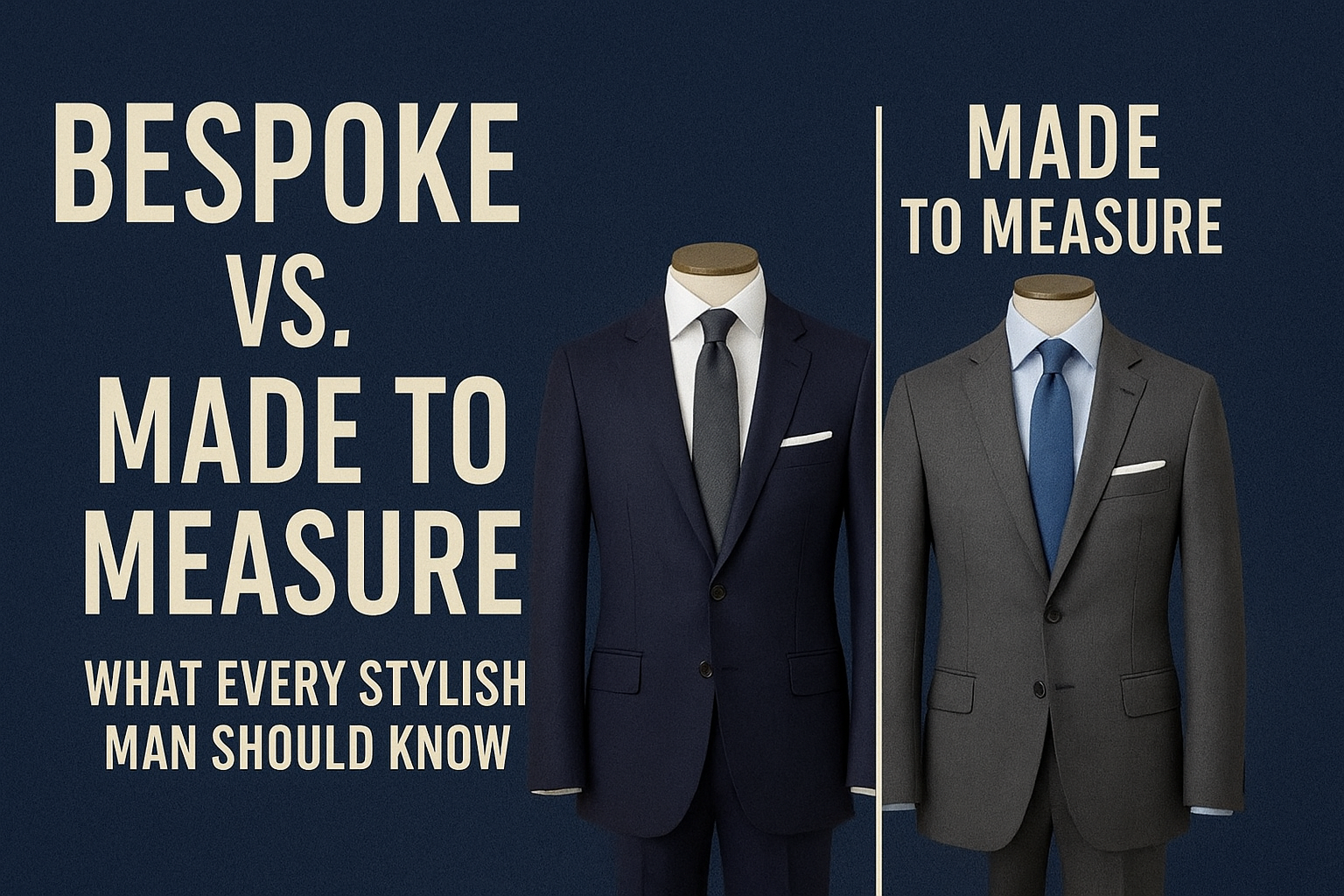When it comes to dressing sharp, few garments command respect and confidence like a perfectly tailored suit. For many men, investing in a quality suit isn’t just about fashion — it’s about presentation, precision, and personality. But when you’re ready to upgrade your wardrobe, you’ll often come across two popular terms: “bespoke” and “made to measure.”
At first glance, they might sound similar — both involve custom tailoring, personalized fits, and premium craftsmanship. Yet, there’s a world of difference between the two. Understanding these differences can help you make the right choice for your style, budget, and lifestyle.
Let’s break down what sets bespoke and men’s made to measure suits apart — and discover which one is best for you.
1. What Is a Bespoke Suit?
The term “bespoke” comes from the British tailoring tradition, literally meaning “to be spoken for.” A bespoke suit is fully custom-made from scratch, created to your exact body measurements, preferences, and style specifications.
Every detail — from the fabric choice and lining to lapel width and button stance — is designed exclusively for you. The process involves multiple fittings, hand-cut patterns, and intricate craftsmanship that ensures your suit is a one-of-a-kind masterpiece.
Key features of a bespoke suit:
- Hand-drafted pattern created specifically for your body
- Multiple fittings (usually 2–4) to refine the perfect fit
- Complete control over every detail — fabric, style, buttons, lapels, stitching, and pockets
- Hand-sewn construction for superior comfort and durability
The result? A flawless, sculpted fit that feels as good as it looks. Bespoke tailoring is for men who appreciate artistry, precision, and timeless elegance.
2. What Is a Made to Measure Suit?
A made to measure suit sits between off-the-rack and bespoke tailoring. It begins with a standard base pattern that’s adjusted to your individual measurements. Unlike ready-to-wear suits, made to measure garments offer a personalized fit and allow you to customize elements such as fabric, lining, buttons, and lapel styles.
However, since it starts with an existing pattern, it doesn’t involve creating a brand-new one from scratch — which makes it faster and more affordable than bespoke.
Key features of a made to measure suit:
- Base pattern adjusted to your body measurements
- Customizable fabric, color, and style details
- Usually one fitting required before completion
- Produced using a mix of machine precision and human tailoring
The result? A high-quality, personalized suit that fits far better than off-the-rack, without the time or cost commitment of full bespoke tailoring.
3. The Main Differences: Bespoke vs. Made to Measure
| Feature | Bespoke Suit | Made to Measure Suit |
| Pattern | Hand-drafted from scratch | Adjusted from a base pattern |
| Fittings | 2–4 fittings for perfection | Usually 1 fitting |
| Customization Level | Fully customizable (every detail) | Moderate customization |
| Production Time | 6–12 weeks or more | 3–6 weeks |
| Price Range | $$$$ (premium luxury) | $$–$$$ (mid to high-end) |
| Craftsmanship | Hand-sewn, artisanal tailoring | Machine-assisted with hand finishing |
| Fit Precision | Absolute precision, sculpted silhouette | Excellent, but not as exact |
In short:
- Bespoke is about perfection and individuality.
- Made to measure is about efficiency and value.
4. When to Choose Bespoke
A bespoke suit is a long-term investment. It’s ideal for men who value luxury, exclusivity, and craftsmanship.
You might choose bespoke if:
- You have unique proportions that don’t suit standard sizing.
- You want to design every detail of your suit, from buttons to lapel stitching.
- You’re building a signature wardrobe for business, special occasions, or formal events.
- You appreciate fine craftsmanship and don’t mind the longer wait time.
With bespoke tailoring, your suit becomes more than clothing — it’s a personal statement of your taste and attention to detail.
5. When to Choose Made to Measure
If you’re looking for a balance between quality, customization, and convenience, made to measure is the perfect choice. It offers much of the luxury of bespoke tailoring at a more accessible price and with a faster turnaround.
You might choose made to measure if:
- You want a custom fit without going full bespoke.
- You prefer high-quality materials and semi-custom designs.
- You need a suit for business wear, weddings, or events and don’t want to wait months.
- You’re after value and comfort in equal measure.
Made to measure suits are versatile, polished, and stylish — ideal for men who take pride in their appearance but lead busy lives.
6. Style Meets Substance: Which One Is Right for You?
Ultimately, the choice between bespoke and made to measure depends on your priorities.
- Go bespoke if you’re after the best of the best, a true tailor-made experience, and want something that reflects your personal identity down to the finest stitch.
- Go made to measure if you value a great fit, premium quality, and reasonable turnaround time without breaking the bank.
Think of it this way:
- Bespoke is like commissioning a masterpiece.
- Made to measure is like owning a limited-edition print — personalized, refined, and impressive.
Both say something powerful about the man who wears them: confidence, care, and class.
Final Thoughts
Whether you opt for bespoke craftsmanship or made to measure convenience, investing in a tailored suit is one of the smartest wardrobe decisions you can make. A well-fitted suit not only enhances your silhouette but also boosts your confidence and leaves a lasting impression.
In a world of fast fashion, taking the time to invest in something made specifically for you is a mark of true sophistication. After all, style isn’t just about what you wear — it’s about how it fits, feels, and represents who you are.
So, when you next step into a tailoring studio, remember: whether bespoke or made to measure, a well-crafted suit is more than clothing — it’s your personal signature, stitched in fabric and form.



